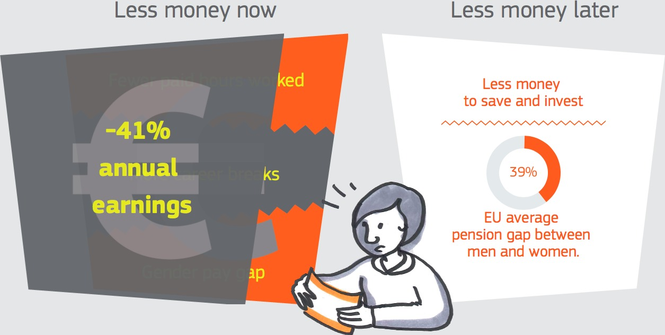This past Monday, November 2, marked the day of the year when women across Europe stop being paid, while men will continue to earn money until December 31. The average hourly wage for women in Europe is 16.3 percent lower than it is for men, so women effectively work 59 days for free each year.
Ahead of this occasion, on October 30, 2015, First Vice-President Timmermans, Commissioner Thyssen and Commissioner Jourová said:
Equality between men and women is one of the fundamental values of the European Union, but this day reminds us that it is not one of its fundamental realities. The pay gap between women and men is already unfair, unjustified and unacceptable in the short term. But in the long term, it accumulates throughout a woman's career and results in an even more significant pension gap, with women's pensions 39% lower than men's.
The results of a Commission consultation published today [30 October 2015, ed.) on equality between women and men confirm that Europeans see the gender pay gap as the most urgent inequality to deal with.
Europe has laws in place on equal pay. But they are not sufficiently enforced on the ground by member states. Last year we made a recommendation to member states to tackle the pay gap. We are supporting the member states, local authorities and other stakeholders to help them make a difference on the ground.
But there has been little or no progress in recent years.
As well as guaranteeing equal pay for women on the labor market, we must give them the means to access the labor market for as long as men. Spending less time on the labor market exacerbates the pension pay gap. This is a question of both mind-sets and opportunities.
In our 2016 Work Program we will take measures to address this challenge by helping working parents with children and those caring for dependent relatives to balance care and career. The new start for working parents and care givers will tackle the lack of affordable childcare, rigid working arrangements or absence of incentives for men to take more care responsibilities in their families.
At the current pace, the gender pay gap is declining so slowly that we will need to wait another 70 years to achieve equal pay – that's not one generation, but two.
The pay gap is everyone's business and everyone stands to gain from its elimination. It's time to close the gap.
A Q&A, an infographic (animated/pdf) and factsheets are available for more information.




